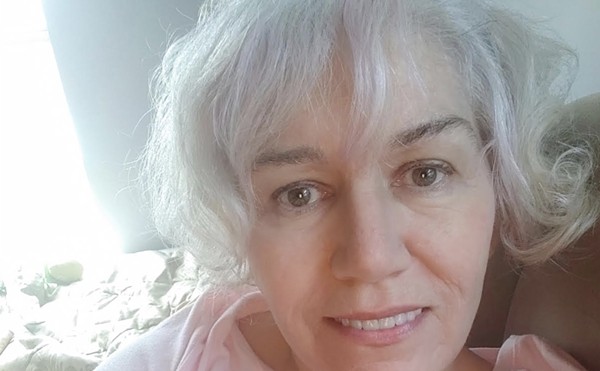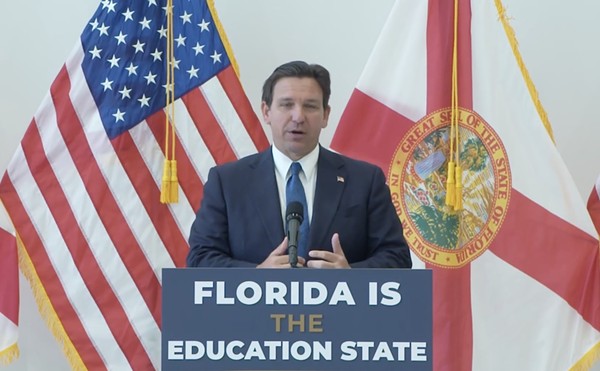(Disclaimer: The boss of Slug, Inc. is taking time off spending afternoons sipping cold beverages. The world will return to normal next week.)
I want to support Buddy Dyer. Really, I do. I mean, I endorsed him last year, so if he performs well my prognosticator cred gets a boost. But more than that, I thought he offered Orlando the chance for real, forward-thinking governance, something we missed dearly during Glenda Hood's reign.
For a while I felt vindicated. Dyer erased a $23 million budget deficit, and pushed an ordinance guaranteeing a living wage for the employees of city contractors. He's brought a glimmer of hope to a moribund downtown, setting the table for high-rises that may bring yuppies into the city's core to live, eat, drink and play. Which, if it works, beats the hell out of Glenda's "theater district" silliness. He's even playing hardball with the gruesome twosome -- Lou Pearlman and Robert Kling -- who Hood foolishly entrusted to revitalize Church Street Station.
But lately Dyer has become his own worst enemy, using Hood-like tactics to brush aside dissent and ram through his (mildly progressive) agenda while giving the finger to those who stand in his way. Recall his disregard for the bar owners who objected to -- or at least wanted to know what the hell was going on with -- the two-waying of Church Street. Similarly, when Buddy moved to redevelop the Jaymont block, historic preservationists were kept in the dark on the demolition. City commissioners who refused to sign outrageous confidentiality agreements were denied information on the incentive-package negotiations, which might include a $3.5 million, no-strings-attached advance to developer Cameron Kuhn.
Hardly open, responsive government. But in terms of policy, what Dyer did with Church Street and the Jaymont block was good, so I'll chalk up his procedural gaffes to a learning curve.
But Dyer's latest misstep is intolerable, and he should be ashamed of himself. At last Monday's city council meeting, commissioners voted to put a residency restriction referendum on the March 9 ballot, basically saying that if you want to run for mayor, you have to have lived within city limits for a year. If you want to be a city commissioner, you have to have lived in your district for a year. The premise is that you can't represent what you don't know.
But look beyond the premise, and what you'll see is a cheap jab at Dyer's political opponents, coming at the expense of democracy itself.
The referendum is reportedly the brainchild of Commissioner Ernest Page, who four years ago won re-election by just 182 votes over Arthur Jackson, who moved into District 6 to challenge Page, and almost pulled it off despite little money and no name recognition. This time around Page has two opponents; both have lived in his district for more than a year. But Page is apparently offended that Lawanna Gelzer challenged District 5's Daisy Lynum two years ago as well.
Think about it: Page has been a commissioner for eight years, and if he's done his job well, outsiders moving in to take him on shouldn't bother him a bit.
For Buddy, who was more than happy to rush to Page's aid, it's a way to remind voters that his opponent isn't a real resident. Ken Mulvaney may have owned property and businesses downtown for more than a decade, but until last month he lived in Belle Isle, just outside city limits. (He rented an apartment to qualify for the race). Since the referendum will share ballot space with the mayoral election, and since local media will likely mention Mulvaney's move every time they talk about the referendum, it's a way for Buddy to subtly jab his opponent while making it more difficult for Republicans to put up a candidate four years from now.
If you need proof how specious this thing is, look at last year's mayoral contest. Attorney Tico Perez moved into city limits to run, but he'd served on the Orlando Utilities Commission since 1997, and knew more about the workings of city government and neighborhood-specific issues than the rest of the candidates combined. Dyer, meanwhile, had spent the last year running for state attorney general, and early in the campaign couldn't answer basic questions about the downtown Community Redevelopment Agency.
Moreover, some members of Dyer's advisory boards live outside city limits, yet he's entrusting them with improving downtown and Parramore. So they know enough to do that, but don't know enough move inside city limits and run for office?
With city council districts, the rule is even more ridiculous. After all, the city redraws its district lines every decade, and neighborhoods are moved into and out of districts. If a neighborhood was added to, say, Patty Sheehan's district, then under the referendum's logic, she wouldn't be qualified to represent them. And more frightening is the prospect that commissioners could -- and probably will -- use the residency rule to draw potential opponents out of their district.
It's incumbent protection, pure and simple. And it's undemocratic. Fortunately, Orlando voters get veto power. Here's hoping they use it.

















